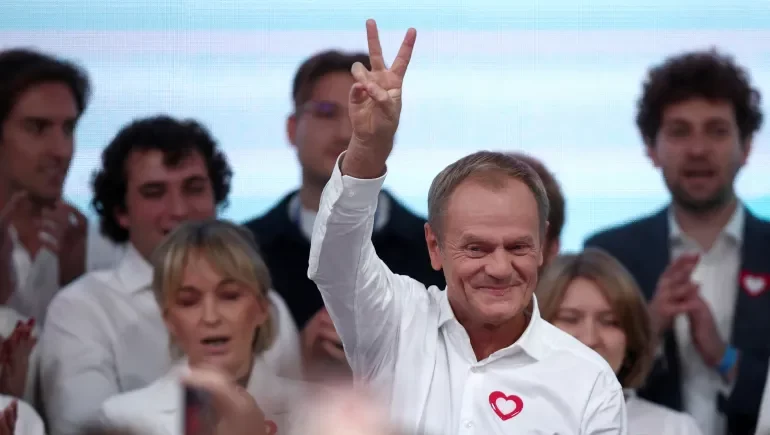In a historic poll in Poland, centrist and progressive forces are poised to form government wresting power from the ruling Law and Justice nationalist party, which has ironically won the most votes for a single party. This is the overwhelming verdict of exit polls which are regarded in Poland as reliable indications of the voting pattern. If the predicted scenario turns out to be true, which is most likely, Poland is going to witness momentous electoral changes comparable to the fall of the Communists in 1989. This time it is the triumph of liberal, democratic parties over rightist, intolerant, anti-immigrant and anti-LGBTQ+ forces. Coupled with this the incumbent party PiS has incurred the wrath of the people for alleged corruption, nepotism and tampering with government institutions to perpetuate a partisan regime that cornered jobs and other privileges for party followers.
The exit polls show a strong second place finish by the main opposition group, Civic Coalition, and better than expected results for two smaller centrist and progressive parties. This means a huge setback for the governing party that was hoping for an unprecedented third consecutive term.
The exit polls in Poland have such credibility that immediately after the results were announced October 15 a jubilant Donald Tusk, Civic Coalition’s leader, said the projected results mean a resounding “win for democracy” that would end the tenure of Law and Justice in power since 2015.
Tusk is a former Prime Minister who had no hesitation after the exit poll results were known to assert it clearly signals the end of “this bad time.” The election for new Parliament was held after a vicious campaign in the highly polarised nation. The European Union nations, Russia and Ukraine have been keenly watching the poll outcome as their future courses of actions have got inextricably linked to it. The Poles seemed to have realised the importance of the elections this time and for this reason they turned out at the booths in record numbers. The voter turnout was nearly 73 per cent which is 10 per cent above the votes polled in 1989 that brought Communist rule to an end. Both the governing Law and Justice and the opposition Civic Coalition made the election this time into a do-or-die moment for the country to ensure Poland has a promising future as a stable democratic state.
If early forecasts turn out to be correct when final official results are announced, likely on 17 October, Civic Coalition and its potential partners have won 248 seats in the 460-member legislature, against 200 in the kitty of Law and Justice. Jaroslaw Kaczynski, the governing party’s chairman and Poland’s de facto leader for the last eight years, has started resigning to the defeat, though he is still clinging to the hope of managing to win. But, he has hardly any chance of retaining power as its ally – a radical right-wing grouping that shares many of the nationalist views of Law and Justice – won only 6.2 per cent of the vote, giving it 12 seats. Exit polls are generally reliable in Poland, though some experts have cautioned that the unusually high turnout could make them less accurate.
Sensing the people’s anti-establishment mood the ruling party had before the poll sought to tilt the balance in its favour by holding a referendum alongside the parliamentary election. Voters were asked to answer four loaded questions about immigration and other issues clearly intended to put the European Union and the opposition known for its pro-EU stand in a bad light. The questions were nothing but the ruling party’s electoral planks. For example, the voters were asked whether they support the admission of thousands of illegal immigrants from the Middle East and Africa, in accordance with the forced relocation mechanism imposed by European bureaucracy. But, many of the voters could see through the game and they stayed away from it responding to a call given by the opposition.
The results as indicated by the exit polls will bring relief to the European Union which is ready to loosen its purse strings and give Poland £30bn for its economic recovery. It has frozen these funds for the anti-EU stand of the ruling party. The EU was also alarmed by the recent posturing of the current dispensation of Poland which stopped supporting Ukraine in its war with Russia. On the other hand, the opposition has made part of its election agenda to reorient the country to the EU and support Ukraine.
But, more than the immediate concerns, the election results in Poland, bringing the liberal and Left parties back to power, are going to be a watershed moment in Europe which is dangerously tilting towards Far-right politics.
